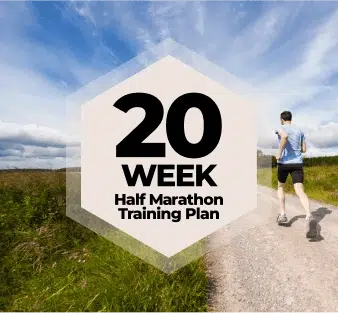You’ve signed up for a half marathon a mere three months away. While 13.1 miles may seem like a huge distance to achieve, it’s definitely possible to train for a half marathon in just 12 weeks — even for a (somewhat) beginner runner.
I’m a professional marathoner and a high school running coach. It’s super important on a short timeline like 12 weeks to train smartly to minimize your risk of getting injured.
For starters, you should already be running at least 10 to 15 miles per week (total). This will allow you to scale up to a long run of 13.1 in 12 weeks. If you’re currently not running at all but still want to run a half marathon in 12 weeks, this couch to half marathon plan is for you.
If you have this foundation already, 12 weeks tends to be the perfect amount of time to get in shape for a half. It’s short enough that you’re less likely to get hurt or burned out along the way, but long enough that you can gradually increase your training and build the confidence necessary to cover 13.1 miles.
If you’re a more seasoned runner looking for a training plan that’s more dynamic to your routine and fitness level, we recommend downloading Runna. “Like a coach in your pocket,” all Half Marathon Guide readers get 2-weeks free with code HALF.
If you fit these pre-reqs, it’s time to get training!
12-Week Half Marathon Training Plans
For a Saturday Race
| Week | Monday | Tuesday | Wednesday | Thursday | Friday | Saturday | Sunday |
| 1 | Off | 3 miles | 3 miles | 3 miles | Off | 4 miles | 3 miles |
| 2 | Off | 3 miles | 4 miles | 3 miles | Off | 4 miles | 3 miles |
| 3 | Off | 3 miles | 4 miles | 3 miles | Off | 5 miles | 3 miles |
| 4 | Off | 3 miles | 5 miles | 3 miles | Off | 6 miles | 4 miles |
| 5 | Off | 4 miles | 5 miles | 4 miles | Off | 7 miles | 3 miles |
| 6 | Off | 4 miles | 4 miles | 4 miles | Off | 8 miles | 4 miles |
| 7 | Off | 4 miles | 6 miles | 4 miles | Off | 9 miles | 4 miles |
| 8 | Off | 4 miles | 6 miles | 4 miles | Off | 10 miles | 4 miles |
| 9 | Off | 4 miles | 6 miles | 4 miles | Off | 11 miles | 3 miles |
| 10 | Off | 4 miles | 5 miles | 4 miles | Off | 12 miles | 4 miles |
| 11 | Off | 4 miles | 5 miles | 4 miles | Off | 6 miles | 3 miles |
| 12 | Off | 3 miles | 5 miles | 3 miles | Off | 13.1 miles | Off |
For a Sunday Race
| Week | Monday | Tuesday | Wednesday | Thursday | Friday | Saturday | Sunday |
| 1 | Off | 3 miles | 3 miles | 3 miles | Off | 3 miles | 4 miles |
| 2 | Off | 3 miles | 4 miles | 3 miles | Off | 3 miles | 4 miles |
| 3 | Off | 3 miles | 4 miles | 3 miles | Off | 3 miles | 5 miles |
| 4 | Off | 3 miles | 5 miles | 3 miles | Off | 4 miles | 6 miles |
| 5 | Off | 4 miles | 5 miles | 4 miles | Off | 3 miles | 7 miles |
| 6 | Off | 4 miles | 4 miles | 4 miles | Off | 4 miles | 8 miles |
| 7 | Off | 4 miles | 6 miles | 4 miles | Off | 4 miles | 9 miles |
| 8 | Off | 4 miles | 6 miles | 4 miles | Off | 4 miles | 10 miles |
| 9 | Off | 4 miles | 6 miles | 4 miles | Off | 3 miles | 11 miles |
| 10 | Off | 4 miles | 5 miles | 4 miles | Off | 4 miles | 12 miles |
| 11 | Off | 4 miles | 5 miles | 4 miles | Off | 3 miles | 6 miles |
| 12 | Off | 3 miles | 5 miles | 3 miles | Off | 2 miles | 13.1 miles |
About This Training Schedule
Who It’s For
This plan is for beginner runners, or those coming off an extended break, who are comfortable running 10 to 15 miles a week and at least 3 miles in one go. In your peak week (week 10), you’ll reach about 30 miles, so it’s important to prime your body to handle the increasing load by having a small foundation of conditioning.
If you don’t have a foundation of miles yet, you can definitely still complete a half marathon in 12 weeks but should check out our couch to half marathon plan instead.
Injury Prevention
Our 12-week training plan is designed to have you increase your mileage safely, overuse injuries like runner’s knee and plantar fasciitis do happen – especially if you increase your mileage too much, too quickly. That’s why it’s really important that you don’t try and go from couch to half marathon in eight weeks.
A reliable adage to minimizing injury is to not increase your mileage by more than 10% of the previous week’s volume. That means you should already be running 4.5 miles regularly to train for a half in 8 weeks.
Otherwise, be sure to:
- Cross-train. Logging additional miles via a different form of cardio like swimming, cycling, or using an elliptical machine can help develop cardio conditioning without the same risk of overuse injury from running. Incorporate cross training sessions on either of the two built-in off days (Monday or Friday). If you’re injury prone, you can also replace one of your runs with a cross training session of a similar length. Just make sure not to go so hard that you make yourself sore or compromise your next run.
- Rest. While you may be capable of handling six or even seven days of running per week, you’ll be better off running a little less while getting more out of your run days and minimizing your risk of injury. The rest days in this training plan fall on Mondays and Fridays, allowing you to hit your weekend training hard and bounce back for your midweek runs. If you’re eager to get some movement in on your off days, you can flush out your legs with a walk, log a cross training session, or spend some time stretching.
- Strength train. Resistance training can make you a more powerful and durable athlete, as well as having a ton of benefits as you age. You can use dumbbells, kettlebells, or even just bodyweight, but I recommend doing two to three 20- to 30-minute strength sessions a week.
What to Eat
Your nutrition while training for a half marathon is as important as the training plan itself. In a nutshell, prioritize a well-balanced diet that emphasizes:
- 50% carbohydrates (your primary fuel source)
- 25% protein (your muscle rebuilder)
- 25% fat
For shorter runs (around 3 miles), your regular eating routine should work fine. But when eating before longer distances (like 10 miles), aim to up your carb intake the day before to ensure your glycogen stores are topped off.
When running over an hour, plan to refuel with 30-60 grams of carbs each hour, using gels, chews, or sports drinks.
Proper hydration is essential too. Sip water throughout the day and incorporate sports drinks or electrolyte supplements during longer runs.
For more guidance, check out our complete breakdown of half marathon nutrition from a sports dietitian, plus our picks for the best snacks and meals for runners.
More Half Marathon Training Plans
8 Weeks • 9 Weeks • 10 Weeks • 14 Weeks • 16 Weeks • 18 Weeks • 20 Weeks
–
We independently produce all the content associated with training plans we feature on HalfMarathons.net. If you buy or sign up for services through the links on our site, we may receive an affiliate commission – which in turn supports our work.





